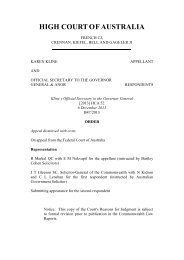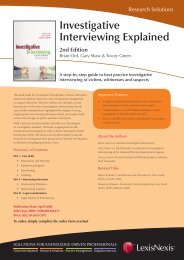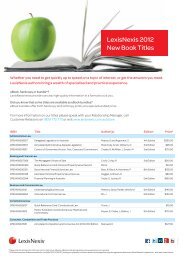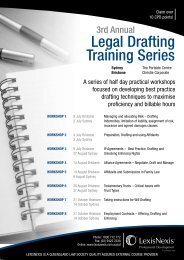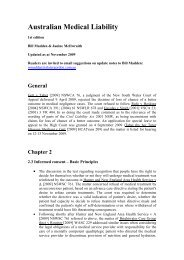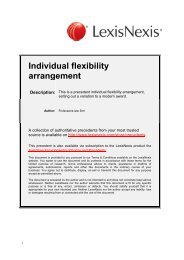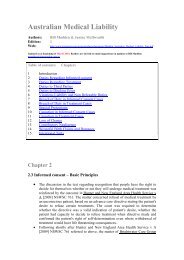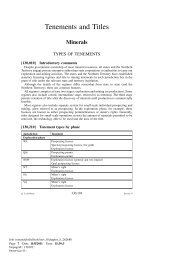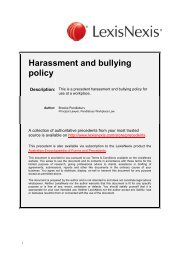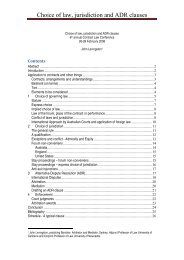Copyright LexisNexis. Sample only, not for classroom use or ...
Copyright LexisNexis. Sample only, not for classroom use or ...
Copyright LexisNexis. Sample only, not for classroom use or ...
Create successful ePaper yourself
Turn your PDF publications into a flip-book with our unique Google optimized e-Paper software.
PRINCIPLES OF AUSTRALIAN EQUITY AND TRUSTS<br />
Entire agreement cla<strong>use</strong>s and equitable estoppel<br />
12.56 A question with respect to equitable estoppel is whether a cla<strong>use</strong> in a contract which denies<br />
any legal effect to previous negotiations and representations can prevent a relying party from pleading<br />
a case based upon equitable estoppel. In relation to such entire agreement cla<strong>use</strong>s, in Franklins<br />
Pty Ltd v Metcash Trading Ltd (2009) 76 NSWLR 603 at 734; 264 ALR 15 at 141, Campbell JA,<br />
speaking <strong>f<strong>or</strong></strong> the Court of Appeal on this point, said:<br />
I would accept that an entire agreement cla<strong>use</strong> … that … specifically denies efficacy to all previous<br />
negotiations and representations, could <strong>not</strong> overcome an equitable estoppel, once established. An<br />
‘entire agreement cla<strong>use</strong>’ might create a factual difficulty in the way of proof of the elements of<br />
equitable estoppel, most obviously, proof of inducement <strong>or</strong> reliance, and I would <strong>not</strong> want to rule<br />
out the possibility that it might be relevant to any precise remedy granted (though I can<strong>not</strong> at<br />
present think of an example of when that might occur). However, it does <strong>not</strong> create an insuperable<br />
obstacle of principle. Consistently with the equitable principle that it will <strong>not</strong> allow a contract to<br />
be an instrument of fraud, equity would <strong>not</strong> permit an entire agreement cla<strong>use</strong> to stultify the<br />
operation of its doctrines.<br />
RELIEF BASED UPON EQUITABLE ESTOPPEL<br />
12.57 Establishing the elements of equitable estoppel gives rise to an equity in favour of the relying<br />
party. This means that the relying party is entitled to some equitable relief. The relief is <strong>not</strong> based<br />
upon there being a promise <strong>or</strong> representation, but rather upon the expectation that the promise <strong>or</strong><br />
representation generated: Giumelli v Giumelli at CLR 121; ALR 482.<br />
12.58 It has often be said that there needs to be prop<strong>or</strong>tionality between the relief <strong>or</strong>dered<br />
and the detriment suffered, <strong>or</strong> that the court will, in making its <strong>or</strong>ders, determine the minimum<br />
equity required to do justice to the relying party: Waltons St<strong>or</strong>es v Maher at CLR 419; ALR 535;<br />
Commonwealth v Verwayen at CLR 417, 429–30, 441–2; ALR 336, 345–6, 354. However, this is no<br />
longer the case. In Walsh v Walsh at [31], Meagher JA stated the current position as follows:<br />
There is no governing principle that requires that the relief granted be that which is the minimum<br />
necessary to do justice. To the extent that there is a prima facie entitlement to relief on the basis<br />
that the adopted expectation is to be made good, that entitlement must be weighed against any<br />
injustice to the estopped party in doing so and the detriment suffered by the party who has acted<br />
upon the induced expectation. Consideration should also be given to whether the proposed relief<br />
has any adverse effects on the interests of third parties.<br />
12.59 In exercising its discretion to make an <strong>or</strong>der in favour of the relying party, in promiss<strong>or</strong>y<br />
estoppel cases the courts have made it clear that the <strong>or</strong>ders to be granted are generally reliance based<br />
in the sense that they are designed to prevent the relying party from suffering detriment: Waltons<br />
St<strong>or</strong>es v Maher at CLR 427; ALR 540; Commonwealth v Verwayen at CLR 411–12, 429, 501; ALR<br />
331–2, 345, 397–8. This is beca<strong>use</strong>, satisfying the relying party’s equity will <strong>not</strong> usually require going<br />
beyond preventing that party from suffering detriment.<br />
12.60 Thus, in Mobil Oil v Lyndel Nominees at 238, the court concluded that relief in such cases<br />
‘is intended to relieve against detriment suffered and <strong>not</strong> to make good an expectation’. Similarly, in<br />
ACN 074 971 109 v The National Mutual Life Association of Australasia at 394, Dodds-Streeton JA said:<br />
<strong>Copyright</strong> <strong>LexisNexis</strong>. <strong>Sample</strong> <strong>only</strong>, <strong>not</strong> <strong>f<strong>or</strong></strong> <strong>classroom</strong> <strong>use</strong> <strong>or</strong> distribution.<br />
282<br />
Spi-Radan & Stewart - Principles of Australian Equity and Trusts 2nd ed. Ch.12.indd 282 10/10/2012 05:22:31<br />
200595



